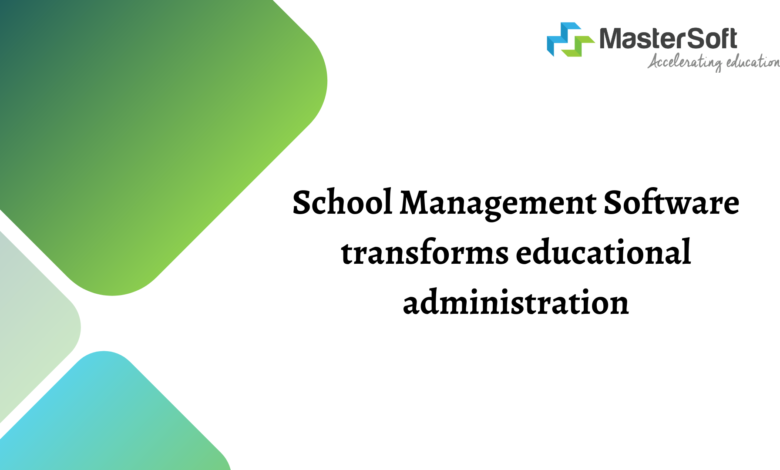School Management Software Revolutionizing Education

In the fast-paced world of education, managing a school efficiently is crucial for both educators and students. Traditional administrative methods can be time-consuming and prone to errors, which is why many educational institutions are turning to School Management Software (SMS). This comprehensive solution streamlines various administrative tasks, enhances communication, and improves overall productivity in schools. In this blog, we will explore the features, benefits, and challenges of implementing school management software.
1. What is School Management Software?
School Management Software refers to a suite of tools designed to automate and manage various administrative tasks within educational institutions. These software solutions cover a wide range of functions, including student enrollment, attendance tracking, grade management, communication between teachers and parents, and financial management. By integrating these processes into a single platform, SMS allows educators to focus more on teaching and less on administrative burdens.
2. Key Features of School Management Software
School Management Software typically includes several key features:
- Student Enrollment and Admission Management: SMS simplifies the enrollment process by allowing online applications, document submissions, and status tracking for prospective students.
- Attendance Management: Educators can easily record and monitor student attendance, generating reports that provide insights into student participation.
- Grade and Report Card Management: SMS enables teachers to enter grades, track student performance, and generate report cards, ensuring timely feedback for students and parents.
- Communication Tools: SMS often includes messaging features that facilitate communication between teachers, parents, and students. Notifications about important events, announcements, and reminders can be sent directly through the platform.
- Timetable Management: Administrators can create and manage class schedules efficiently, ensuring optimal resource allocation and minimizing scheduling conflicts.
- Fee Management: SMS allows schools to manage student fees, track payments, and generate invoices, streamlining the financial aspect of education.
3. Benefits of Using School Management Software
The implementation of school management software comes with several advantages:
- Increased Efficiency: Automating routine administrative tasks saves time and reduces the likelihood of human error, allowing staff to focus on more critical aspects of education.
- Improved Communication: SMS fosters better communication between teachers, parents, and students, keeping everyone informed and engaged in the educational process.
- Enhanced Data Management: Schools can maintain accurate records of students’ academic performance, attendance, and other essential data, making it easier to analyze trends and make informed decisions.
- Accessibility: Many SMS solutions are cloud-based, allowing access to important information from anywhere, anytime. This flexibility supports remote learning and collaboration.
- Cost-Effective: By reducing the need for paper-based processes and manual data entry, SMS can lead to significant cost savings for schools over time.
4. Challenges of Implementing School Management Software
Despite its benefits, implementing school management software can present challenges:
- Initial Investment: The upfront cost of purchasing and implementing SMS can be a barrier for some educational institutions, particularly smaller ones with limited budgets.
- Training Requirements: Staff and teachers may require training to effectively use the new software, which can take time and resources.
- Data Migration: Transitioning from traditional methods to an SMS may involve migrating existing data, which can be complex and may require technical expertise.
- User Adoption: Resistance to change can be a significant hurdle. Educators and staff accustomed to traditional methods may be reluctant to embrace new technology.
5. Choosing the Right School Management Software
Selecting the right SMS for your institution requires careful consideration:
- Identify Your Needs: Assess the specific administrative tasks your school needs to manage effectively. This will help you choose a solution that meets your unique requirements.
- Research Options: Explore various software providers and their offerings. Look for features, scalability, and customer support that align with your needs.
- Check User Reviews: Read reviews and testimonials from other educational institutions to gauge the effectiveness and reliability of the software.
- Request a Demo: Before making a decision, request a demo to see the software in action. This will allow you to assess its user-friendliness and functionality.
6. The Future of School Management Software
As technology continues to advance, the future of school management software looks promising. Innovations such as artificial intelligence and machine learning are increasingly being integrated into SMS solutions, enhancing their capabilities. These technologies can offer personalized learning experiences, analyze student performance data, and provide valuable insights to educators.
Furthermore, with the rise of online and hybrid learning environments, SMS will play a crucial role in supporting schools as they adapt to new educational models. The flexibility and efficiency of school management software will help institutions meet the evolving needs of students and educators.
Read More Here
7. Conclusion
School Management Software represents a significant advancement in the way educational institutions handle administrative tasks. By streamlining processes, enhancing communication, and providing valuable insights, SMS empowers educators to focus on what truly matters – teaching and nurturing students. While challenges exist, the benefits of implementing school management software far outweigh the difficulties, making it an essential tool for modern education. As technology continues to evolve, SMS will undoubtedly play a pivotal role in shaping the future of education, providing schools with the tools they need to succeed in an increasingly complex world.




